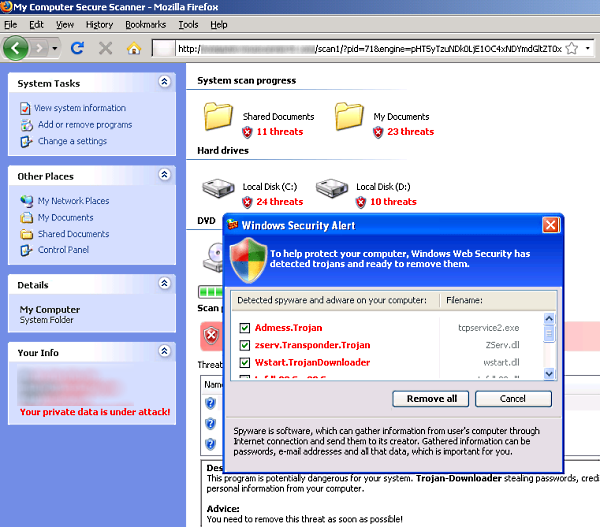Alerta de WEBSENSE: Fake Alert como Microsoft Security Essentials
No hace falta traducirlo: Otro FAKE ALERT, segun informa WebSense : (Esta vez del MORRO)
[quote]
Threat Type: Malicious Web Site / Malicious Code
Websense Security Labs™ ThreatSeeker™ Network has discovered that search engine results for information on how to download Microsoft’s recently released Security Essentials tool are returning links to Web sites that serve rogue AV.
Malware authors have used Search Engine Optimization (SEO) techniques to mix rogue search results in with legitimate results. For example, one of the rogue links is directly under a MSDN blog entry discussing Microsoft Security Essentials. The rogue redirects are hosted on compromised Web sites, including a Canadian publisher’s Web site and the British Travel Health Association.
When a user browses to the compromised Web sites, so long as they have been referred by a search engine, they are redirected to malicious Web sites with domain names such as computer-scanner21 and computervirusscanner31.
An example of one of the payload files shows that AV detection is low. One such file is named Soft_71.exe (SHA1: 4e58a12a9f722be0712517a0475fda60a8e94fdc)
If the user downloads the application, a file with extension .tif is downloaded in the “program files\TS” directory as TSC.exe and system.dat (the .tif file is decrypted/decompressed and split).
The payload then executes “tsc.exe -dltest” apparently connects to a NASA Web site, to check internet connectivity.
Finally, “tsc.exe” is executed with no parameters, and the rogue AV starts. (In the background the original file is deleted).
Since yesterday the Websense ThreatSeeker Network has been monitoring SEO poisoning of search terms related to Microsoft Security Essentials. It appears that the malware authors set up a trial run of SEO poisoning techniques, before converting the redirects to deliver rogue applications today.
Screenshot of Google search results:
Screenshot of rogue AV Web site:

Screenshot of download prompt:

[/quote]
Recordar que es un falso testeador, que los datos obtenidos no son verdad, y que lo que intenta es que se acepte eliminar los supuestos malwares para introducir troyanos !!! Debe cortarse el proceso, cerrar el navegador y reiniciar el ordenador. Así yo he conseguido no infectarme 🙂
Vaya MORRO ! 🙂
saludos
ms, 1-10-2009
NOTA: Los interesados en información sobre contrato de soporte Asistencia Tecnica de SATINFO y/o licencia de uso/actualizaciones de sus utilidades, contacten con info@satinfo.es
__________
Este blog no se hace responsable de las opiniones y comentarios de los textos en los que se cita la Fuente, ofreciendo su contenido solo para facilitar el acceso a la información del mismo.
Puedes seguir cualquier respuesta a esta entrada mediante el canal RSS 2.0. Los comentarios y los pings están cerrados.


Los comentarios están cerrados.